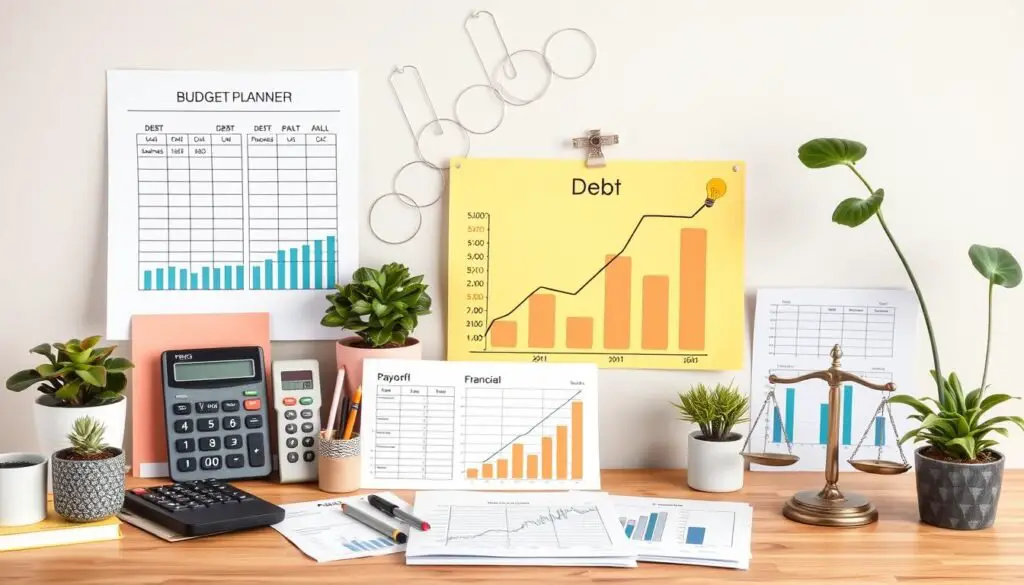Women are playing a bigger role in the economy, but they still face pay gaps and wealth barriers. Knowing how to manage money, budget, invest, and save is key. Yet, women often struggle more with these tasks due to lower confidence, pay gaps, and less savings than men.
This guide is here to help women gain the financial skills they need. By learning these important skills, women can better handle their finances. They can make smart choices and secure their financial future.
Key Takeaways
- Financial literacy is crucial for women to achieve financial independence and security.
- Women face unique financial challenges, including wage gaps, lower savings rates, and barriers to wealth growth.
- Mastering essential financial skills can empower women to make informed decisions and achieve their financial goals.
- Developing a strong money mindset and understanding key financial concepts are foundational for women’s financial success.
- Proactive financial planning and management can help women overcome obstacles and build a secure financial future.
Understanding the Current State of Women’s Financial Literacy
Financial literacy is key for making smart money choices. It helps people stay financially stable and secure. But, there’s a big gap in women’s financial knowledge that must be fixed.
Key Statistics and Gender Gap Analysis
Recent studies show women get only 45% of personal finance questions right, while men get 55%. This gap makes it hard for women to manage money, deal with debt, and handle financial surprises. Also, only 53% of women feel sure about their retirement plans.
Impact of Financial Literacy on Women’s Economic Well-being
Women’s lack of financial knowledge affects their economic health. Women with low financial literacy are more likely to live in poverty, struggle with debt, and have trouble securing their financial future. This is especially true for female-headed households, where 75% with less than a high school diploma live in poverty.
Common Financial Challenges Faced by Women
- Lower wages: Women generally earn less than men, making saving and investing harder.
- Career interruptions for family care: Women often take time off to care for children or elderly relatives, affecting their earnings and retirement savings.
- Longer life expectancy: Women live longer than men, so they need to plan for longer retirements and healthcare costs.
It’s vital to tackle the gender gap in financial literacy to empower women. By offering financial education and resources, we can help women gain the knowledge and tools for financial security and independence.

Developing a Strong Money Mindset
A strong money mindset is key for financial confidence and wealth-building in women. Many women face negative money beliefs, shaped by childhood or society. By changing these beliefs and adopting an abundance mindset, women can reach their financial goals.
Lesley Thomas, founder of The Money Confidence Academy, helps ambitious women with money. She pushes for financial education in schools. She also offers online resources like Money@SchoolTM and Money@HomeTM.
Female entrepreneurs often face self-worth and boundary issues. Lesley uses NLP, hypnotherapy, and mindset work to help. This way, women can manage money better and feel more financially confident.

Lesley believes mindset greatly affects money outcomes. By debunking money myths and having a positive money mindset, women can spend without fear. They can also set prices with confidence and talk about money openly.
Building a strong money mindset is a journey. It needs ongoing learning, self-reflection, and expert help. Getting advice from financial advisors, coaches, or mentors is helpful. Joining financial support groups also offers valuable info and boosts commitment to financial health.
In the end, a positive money mindset lets women set financial goals and celebrate small victories. It helps them change negative thoughts into positive ones. This mindset boost can lead to more financial confidence and wealth-building for women.
Essential Financial Literacy Skills for Women
Financial literacy is key for women’s economic power and financial safety. Learning to budget, manage emergency funds, and keep a good credit score can lead to financial stability and growth.
Budgeting and Expense Tracking
Learning to budget is a big step for women. Budgeting for women means using a zero-based budget, where every dollar is for needs, savings, or smart investments. Keeping track of expenses helps women control their money and make smart choices.
Emergency Fund Management
An emergency fund is a safety net for unexpected events. Women should aim to save 3-6 months’ worth of living expenses. Emergency savings help protect against job loss, medical emergencies, or other financial surprises, giving women the strength to face challenges.
Credit Score Building and Maintenance
Credit management for females is vital for good loan terms and financial opportunities. Women should work on a solid credit history by paying bills on time and keeping credit use low. Checking credit scores regularly and improving them can greatly improve women’s financial situation.
By mastering these financial skills, women can achieve financial freedom, resilience, and reach their long-term goals.

“Investing in women’s financial literacy is not just a smart decision, it’s a necessity for economic growth and gender equality.” – Rania Uwaydah Mardini, International Ethics Standards Board for Accountants
Smart Debt Management Strategies
Understanding the difference between good debt and bad debt is key in personal finance. Good debt, like a mortgage or student loans, can be a smart investment. On the other hand, bad debt, like high-interest credit cards, can quickly become a financial weight.
First, women should make a list of all their debts. Note the amounts owed and the interest rates. This helps identify where to focus on reducing debt. A good strategy is to pay off high-interest debts first. They grow the fastest. Or, start with smaller debts for a quick win and motivation.
It’s crucial to avoid taking on new debt to pay off old debt. This can create a cycle of debt. If debt feels overwhelming, get help from a financial advisor or credit counselor. They can offer tailored advice and strategies to help you manage your finances.
| Debt Reduction Strategies for Women | Good Debt vs. Bad Debt |
|---|---|
|
|

Investment Fundamentals for Female Investors
Women are playing a bigger role in managing their money. They face challenges like limited access to capital and lack of financial knowledge. But, women who invest regularly do better than men, showing the value of learning about investing.
Understanding Investment Vehicles
Knowing about different investments like stocks, bonds, mutual funds, and real estate is key. Each has its own risks and rewards. Women need to understand these to make smart choices.
Risk Assessment and Portfolio Diversification
Knowing how much risk you can handle is important. Women, with more caregiving duties, should think carefully about this. Spreading investments out can help women reach their financial goals and manage risks.
Long-term Investment Planning
Planning for the long term means matching your goals with the right investments. Women are set to control $30 trillion by 2030, according to McKinsey. By focusing on long-term investment strategies and portfolio diversification, women can secure their financial futures.
“When women are more involved in investing and financial leadership, everyone benefits from improved investment outcomes.”

| Investment Metric | Women | Men |
|---|---|---|
| Wealth Controlled by 2030 | $30 Trillion | N/A |
| Investment Fund Managers | 14% | 86% |
| Corporate Executives | 25% | 75% |
| Finance Professors | 31% | 69% |
Retirement Planning Essentials
Retirement planning is key to financial security, especially for women. Women often live longer and may take career breaks, leading to less savings than men.
Women usually have 50% less in their 401(k)s than men. It’s vital for women to focus on retirement planning. Using employer plans like 401(k)s and 403(b)s is a smart move. Also, looking into traditional or Roth IRAs can boost your savings.
Knowing about Social Security is also important. Women often earn less than men, affecting their Social Security. Planning for these benefits can help secure your financial future.
- Start saving for retirement early to benefit from compound growth.
- Contribute to employer plans like 401(k)s and 403(b)s for tax benefits and potential matches.
- Look into traditional and Roth IRAs to add to your savings.
- Consider how career breaks, like caregiving, might affect your earnings and savings.
- Figure out how much you’ll need for retirement, including extra costs like healthcare.
- Spread out your investments to handle market ups and downs and meet your retirement goals.
By being proactive and focusing on retirement planning, women can ensure a secure and comfortable retirement.

“The key to a secure retirement is to start saving early and regularly, maximize tax-advantaged accounts, and diversify your investments to manage risk.”
Building Wealth Through Real Estate
Women are making big strides in financial freedom and owning homes. The real estate market is a great chance to build wealth. But, it can be tough, especially for beginners.
First-time Homebuying Tips
More single women are buying homes than single men. But, women often pay more and sell for less. It’s key for women to know about mortgages, budgeting, and the costs of owning a home.
- Establish a strong credit score and manage debt effectively
- Research down payment assistance programs and explore first-time buyer grants
- Work with a real estate agent who understands the unique needs of female buyers
- Carefully evaluate the true cost of homeownership, including maintenance and taxes
Property Investment Strategies
Though women are a minority in real estate, more are getting into it. They’re exploring different ways to invest, like renting out properties or flipping houses. It’s important to have a solid plan and know the risks and benefits.
- Educate yourself on different investment options, such as residential, commercial, and REITs
- Develop a deep understanding of market trends, property valuations, and rental income potential
- Seek out mentorship and networking opportunities with experienced female investors
- Leverage resources like women-focused financial programs and grants to secure favorable financing
By teaching women about real estate, we can close the gap in property investment. This can lead to significant wealth and financial security.

“Real estate investing is a powerful way for women to build long-term wealth and financial security. It’s an opportunity to take control of our financial futures and create the life we envision.”
– Yvonne Leung, Wealth Management Advisor
Understanding Insurance and Protection
Women need to know how important insurance and protection are. Good coverage keeps your assets safe and your finances stable. It helps with unexpected events or health problems. The right policies can offer the financial safety you need.
Women usually live longer than men. This means they might face higher healthcare costs over time. It’s key to have a good insurance plan. Knowing about different insurances and their benefits helps you make smart choices for your money and safety.
Getting insurance for women is a smart move for financial protection and risk management. It helps you plan for the future and protect your family. With the right insurance, you can face life’s ups and downs with confidence.
- Understand the different types of insurance, including health, life, disability, and long-term care.
- Evaluate your insurance needs based on your income, expenses, debts, and future financial obligations.
- Research and compare insurance policies to find the most suitable and affordable coverage.
- Integrate insurance planning into your broader financial strategy to ensure comprehensive protection.
“Investing in insurance is not just about protecting your finances; it’s about safeguarding your future and the well-being of your loved ones.”
By embracing the power of insurance for women, you can take charge of your financial future. You’ll build a strong base for long-term financial protection and risk management.

Career Financial Planning
Women in their careers need a solid financial plan for security and growth. This includes learning how to negotiate salaries and make the most of workplace benefits. These steps can greatly improve their financial health.
Salary Negotiation Techniques
Women often earn about 16% less than men in full-time jobs. Learning to negotiate salaries is key to closing this gap. By researching pay standards, showing off their skills, and speaking up for their worth, women can get fair pay.
Workplace Benefits Optimization
Knowing and using workplace benefits well can boost a woman’s financial security. Benefits like retirement plans, health insurance, and training can help secure a stable financial future. Women should check out these options and see how they fit with their goals.
By focusing on career financial planning, women can secure their financial futures. They can improve their negotiation skills and use workplace benefits to reach financial freedom and well-being.

“Negotiating your salary is one of the most important financial decisions you can make. It’s the foundation for building wealth and achieving financial security.” – Kelley Long, certified financial planner
Managing Finances During Life Transitions
Life’s big changes, like divorce or widowhood, can be tough on a woman’s finances. One in five women loses financial stability after divorce. It’s key to plan for these changes and understand their financial impact.
Adjusting your financial plans is vital during these times. Getting help from a financial expert can be very helpful. They offer advice and help you make smart choices. A good financial plan helps you set and reach your goals, even when life changes.
- Maximize assets through various financial strategies after events like death or divorce.
- Ensure adequate insurance coverage to protect against financial risks during life changes.
- Maintain liquidity in financial assets, as it can be beneficial during challenging life transitions.
It’s important to protect your money through smart tax planning and investment. Building different income sources, like renting out property, can also help. This way, you stay financially stable during big life changes.
“Having a detailed financial plan is essential during various life circumstances to set realistic goals and actionable steps.”
Knowing about money and talking openly with loved ones is crucial. Learning about personal finance and joining workshops can help. Having a supportive group can offer advice and a sense of belonging.
By tackling divorce finance and widowhood planning head-on, women can secure their financial future. They can come out of these life changes with financial strength and freedom.
Tax Planning and Management
Taxes can be overwhelming, but they’re key to financial literacy for women. Knowing how to plan taxes can save a lot of money. It helps women reach their financial goals. By using tax deductions and credits, and smart investing, women can improve their finances.
Unlocking Tax Deductions and Credits
Women entrepreneurs are driving innovation and growth. They can use tax credits and deductions to lower their taxes. Staying up-to-date with tax changes helps women make the most of these benefits.
Tax-Efficient Investment Strategies
Good tax planning isn’t just for businesses. Women investors can also benefit from smart tax strategies. Using retirement accounts and understanding capital gains tax can increase returns while lowering taxes. This way, women can grow their wealth and secure a better future.
Tackling tax planning and management is tough, but it’s essential for women’s financial success. By using smart tax strategies, women can open new doors, grow their businesses, and build a prosperous future.
Digital Tools and Resources for Financial Management
In today’s digital world, women have many financial apps and tools at their fingertips. These tools help improve financial literacy and well-being. They make managing money easy, from tracking expenses to investing.
Financial apps for women are a big help. They offer budgeting, saving, and investing solutions. These apps are easy to use, track expenses automatically, and give personalized advice.
Online budgeting tools are also great. They let you create budgets, set financial goals, and track your progress. These tools connect with your bank accounts and credit cards, making expense tracking simple.
For deeper money management knowledge, there are many online resources. You can find tutorials, webinars, and articles on various financial topics. They cover everything from investing basics to retirement planning.
| Digital Tool | Key Features | Benefits |
|---|---|---|
| Mint | Comprehensive budgeting, expense tracking, and credit monitoring | Helps users gain a clear understanding of their financial situation and make informed decisions |
| YNAB (You Need a Budget) | Detailed budgeting, goal-setting, and debt management | Encourages mindful spending and financial discipline |
| Acorns | Automated investment platform, micro-investing, and robo-advisory services | Makes it easy for beginners to start investing and build long-term wealth |
By using financial apps for women, online budgeting tools, and digital money management resources, women can manage their finances better. This empowers them to make smart financial choices and reach their goals.
Conclusion
Learning key financial skills is vital for women to gain financial empowerment and financial independence. They must tackle the financial challenges they face. This includes using available resources and improving their money management skills. Doing so helps women control their financial futures and build wealth over time.
The gender gap in financial literacy is a big issue. Only 30% of women worldwide are financially literate, compared to 35% of men. This shows how crucial it is to focus on teaching women about finance. By closing this gap, women can make informed financial decisions and manage their money well.
Women face many financial hurdles, especially during life’s big changes. They need to keep learning about finance and manage their money wisely. By staying informed and seeking advice, women can overcome these challenges. This leads to achieving their financial goals and a brighter future.
FAQ
What is the current state of women’s financial literacy?
Women answer 45% of personal finance questions right, while men get 55%. This shows a big gap in financial knowledge. This gap makes it hard for women to manage money, deal with debt, and handle unexpected expenses.
What are the common financial challenges faced by women?
Women often struggle with money due to lower confidence and pay gaps. They save less and live longer, needing more money for retirement. These issues make it tough for women to be financially independent.
How can women develop a strong money mindset?
A strong money mindset is key to financial success. Women should look at their money beliefs, often shaped in childhood. They should create a money philosophy based on abundance.
Understanding what you can control is vital. Changing from a scarcity to an abundance mindset can greatly improve financial choices and outcomes.
What are the essential financial literacy skills for women?
Important skills include budgeting, tracking expenses, and managing emergency funds. Women should also know about credit scores, good vs. bad debt, and how to reduce debt.
How can women approach investing and retirement planning?
Women who invest regularly do better than men. They need to know about different investments, understand risk, and diversify their portfolios. It’s also key to maximize retirement plans and know about Social Security.
What are the financial considerations for women in real estate and homeownership?
Single women are leading in buying homes, making up a big part of first-time buyers. But, they often pay more and sell for less than men. It’s important to understand mortgages, property investments, and the long-term wealth-building in real estate.
How can women protect their financial well-being through insurance?
Women should know about health, life, disability, and long-term care insurance. They live longer, so they might face higher healthcare costs. Having the right insurance is key to protecting assets and staying financially stable.
What are the key considerations for women in career financial planning?
Women need to be good at negotiating salaries to close the pay gap. They should also understand and use workplace benefits like retirement plans and health insurance. This can greatly improve their financial health.
How can women manage finances during life transitions?
Women face big financial challenges during life changes like divorce or becoming a widow. They should plan for these changes, know the legal and financial sides of divorce, and find ways to stay financially independent.
What tax planning strategies can benefit women?
Women need to understand how taxes affect their money decisions. Knowing about tax deductions and credits can save a lot. Using tax-efficient investments and understanding capital gains tax can also help maximize returns and lower taxes.
How can digital tools and resources enhance women’s financial management?
Digital tools and resources can greatly improve financial management. Women should check out budgeting apps, investment platforms, and online financial education. These can help with tracking expenses, managing investments, and learning more about money.

One Reply to “Essential Financial Literacy Skills for Women”